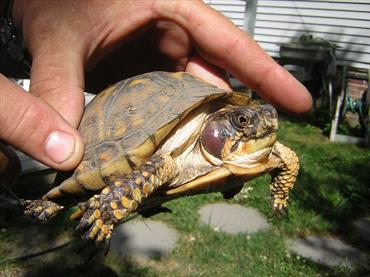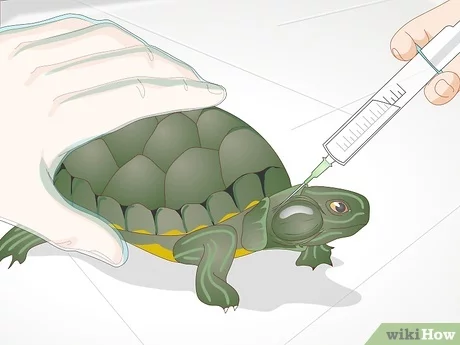To treat a turtle ear abscess at home, clean the area with a gentle antiseptic solution and apply a warm compress to help reduce swelling and promote healing. Regular monitoring and veterinary consultation are crucial for proper care.
Ear abscesses in turtles can be a common health issue that requires prompt attention. These infections can be painful and lead to serious complications if left untreated. By following the correct treatment steps at home, you can help alleviate your turtle’s discomfort and aid in their recovery process.
Understanding the symptoms and causes of ear abscesses, along with proper hygiene practices, will ensure your turtle receives the care they need. We will explore effective home remedies and best practices for treating turtle ear abscesses.

Credit: www.wikihow.pet
Recognizing Turtle Ear Abscess
Common Symptoms
Turtle ear abscess can present with visible signs that indicate your pet turtle may be suffering from this condition. Some common symptoms include:
- Swelling around the ear area
- Redness or inflammation
- Pus or discharge coming from the ear
- Turtle rubbing or scratching at the affected ear
Causes Of Turtle Ear Abscess
Ear abscesses in turtles can be caused by various factors, such as:
- Poor water quality in the turtle’s habitat
- Sharp objects or rough surfaces in the tank injuring the ear
- Bacterial or fungal infections
Home Treatment Options
Turtle ear abscesses can be effectively treated at home with proper care and attention. Here are some essential Home Treatment Options to help your turtle recover:
Cleaning The Abscess
Begin by gently cleaning the abscess with a mild antiseptic solution and warm water.
Applying Topical Antibiotics
After cleaning, apply a thin layer of topical antibiotics directly on the abscess to prevent infection.
Oral Antibiotics Administration
If the abscess is severe, consult a veterinarian for oral antibiotics administration to combat the infection internally.
Creating A Comfortable Environment
Creating a comfortable environment is essential for treating a turtle ear abscess at home. By maintaining proper water quality and providing a stress-free habitat, you can ensure your turtle has the best chance of recovery.
Maintaining Proper Water Quality
Maintaining proper water quality is crucial for the health of your turtle. Ensure the water in the tank is clean and free from any contaminants. Regularly test the water parameters such as pH, ammonia, and nitrate levels to ensure they are within the optimal range for your turtle’s well-being.
Providing A Stress-free Habitat
Turtles are susceptible to stress, which can exacerbate health issues such as ear abscesses. Create a stress-free habitat by providing a spacious and clean enclosure with adequate hiding spots and basking areas. Minimize loud noises and disturbances in the turtle’s environment to reduce stress and promote healing.

Credit: www.youtube.com
Dietary Considerations
When treating a turtle ear abscess at home, dietary considerations play a crucial role in supporting the healing process and overall health of the turtle. By providing nutrient-rich foods and supplementing with essential nutrients such as Vitamin A, you can help your turtle recover from an ear abscess and prevent future health issues.
Offering Nutrient-rich Foods
Nutrient-rich foods are vital for supporting the immune system and promoting healing in turtles with ear abscesses. When selecting foods for your turtle, prioritize options that are high in essential vitamins and minerals, such as:
- Dark, leafy greens like kale and collard greens
- High-quality commercial turtle pellets fortified with essential nutrients
- Small amounts of fruits such as strawberries or melon as occasional treats
- Live or frozen prey items like earthworms or crickets for added protein and variety
Supplementing With Vitamin A
Vitamin A is crucial for maintaining healthy skin and mucous membranes, which can aid in the healing of turtle ear abscesses. However, it’s important to supplement with caution, as excessive Vitamin A can be harmful. You can provide Vitamin A through:
- Offering small amounts of high-quality liver as a treat
- Using commercial reptile supplements specifically formulated for turtles
- Including Vitamin A-rich foods like sweet potatoes or carrots in your turtle’s diet
Monitoring The Healing Process
Monitoring the healing process of a turtle with an ear abscess is crucial to ensure that the treatment is effective and the turtle is on the path to recovery. By closely observing the healing progress and behavior changes, you can address any issues promptly and provide the necessary care for your turtle.
Regular Check-ups
Regular check-ups are essential to monitor the healing of a turtle’s ear abscess. Schedule visits to the veterinarian to assess the progress of the treatment and ensure that the abscess is healing properly. The vet can provide valuable insights and make any necessary adjustments to the treatment plan based on the healing progress.
Observing Behavioral Changes
Observing behavioral changes in your turtle can provide valuable clues about the healing process. Look for signs of discomfort, changes in activity levels, or any unusual behavior that may indicate complications or slow healing. By staying attentive to your turtle’s behavior, you can address any issues promptly and ensure a smooth recovery.
When To Seek Veterinary Care
Signs Of Worsening Condition
If you notice any of the following signs, it is crucial to seek immediate veterinary care:
- Increased swelling or redness around the ear abscess
- Elevated body temperature or fever
- Pus drainage from the abscess
Importance Of Professional Examination
A professional examination is vital for accurate diagnosis and treatment of turtle ear abscess. Veterinary intervention ensures proper care and prevents potential complications that may arise from untreated abscesses. Delaying professional care can worsen the condition and harm your turtle’s health.
Preventive Measures
- Keep the turtle’s tank clean by regularly removing waste and uneaten food.
- Ensure the habitat is dry to prevent the growth of bacteria that can lead to ear abscesses.
- Provide proper filtration to maintain water quality and cleanliness.
- Inspect your turtle’s ears regularly for any signs of infection or swelling.
- Monitor your turtle’s behavior for any changes that may indicate a health issue.
- Consult a veterinarian for routine check-ups and guidance on preventive care.
Conclusion And Long-term Care
Proper long-term care is crucial for treating turtle ear abscess effectively. By following these steps, you can ensure your turtle’s continued health and well-being.
Emphasizing Regular Turtle Health Maintenance
Regularly clean your turtle’s habitat to prevent infections and monitor their overall health for any signs of illness.
- Inspect your turtle’s ears regularly for any redness or swelling.
- Handle your turtle gently to avoid causing stress or injuries.
Ensuring A Safe And Healthy Environment
Creating a safe and healthy environment is key to preventing ear abscesses in turtles.
- Maintain proper water quality in your turtle’s tank to prevent bacterial growth.
- Provide a balanced diet to boost your turtle’s immune system and overall health.
By following these long-term care practices, you can help your turtle stay healthy and happy for years to come.

Credit: veterinarypartner.vin.com
Conclusion
Taking care of turtle ear abscess at home is not difficult if you follow the right steps. Always ensure you maintain a clean environment for your turtle and monitor any changes in its behavior. Early detection of ear abscess is key to successful treatment.
However, if you notice any worrying symptoms, do not hesitate to contact a veterinarian for professional advice and treatment. With a little patience and effort, you can help your turtle regain its health and happiness.






Leave a Reply